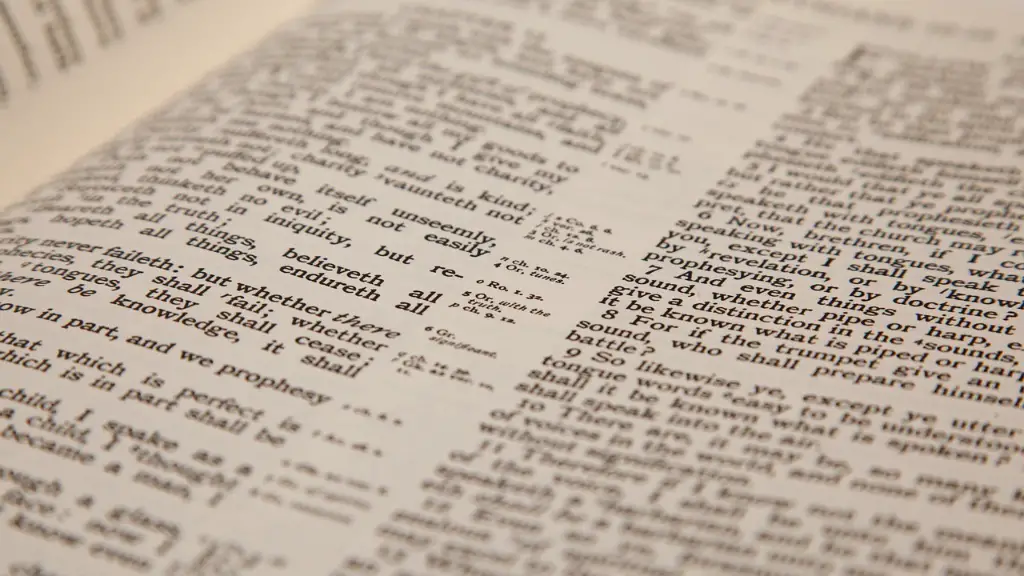The Bible is the most popular book in history, and for good reason. It has changed lives, started revolutions, and comforted the brokenhearted. But how do we know that the Bible is actually God’s Word? How can we be sure that it is not just a nice book of stories and moral teachings, but actually the breathed-out revelation of the Almighty?
The Bible is the word of God because it was written by people who were inspired by the Holy Spirit.
How do we know that the Bible is really the Word of God?
The biblical basis for clarity about what the Bible teaches is derived from two sources. First, the words of Scripture are self-attesting because they claim to be from God. Second, the Holy Spirit’s dynamic power applies the truth of Scripture, resulting in a confident assurance in the Word itself.
The Bible is the Word of God because it is a record of His Son, Jesus Christ. It is the story of how God created the world and how His Son came to save it. The Bible is also a record of how we can live our lives according to God’s will. It is a guide for how to live a good and meaningful life. The Bible is also a source of comfort and hope, because it tells us that no matter what happens in this life, we have a future with God.
Why do we believe that the Bible is the Word of God
The Bible is God’s word because it speaks of Jesus. Jesus is an amazing person, and the Bible is our primary record of what he did and said.
The Bible is a unique book in that it is both human and divine in origin. The stories, poems, histories, letters, prophecies, and other writings come from a deep collaboration between humanity and God. This collaboration is what makes the Bible so special and meaningful.
How do we know the Bible is reliable?
The Bible is the most surviving ancient document, with around 24,000 manuscripts from all over the world. Its text has been put to the test for variants and corruption, and it has been found to be reliable. Some of the earliest manuscripts date back to the second century.
Archaeology is the study of the material remains of past cultures. It can be used to help determine the history of a place, as well as the people who lived there.
The Bible is a historical document, and modern archaeology has helped to validate its accuracy. There have been thousands of archaeological discoveries in the past century that support the Bible. These discoveries help to corroborate the Bible’s account of history and provide valuable insights into the people and cultures mentioned in the Bible.
The Bible is an important source of information for archaeologists, and modern archaeology has shown that the Bible is accurate in its details. These discoveries help us to understand the Bible and the people who lived in the Bible times better.
Why do Catholics believe the Bible is the word of God?
The Bible is a sacred text for Catholics and other Christians. It is a record of God’s dealings with humanity, and contains stories, teachings, and laws that are meant to guide Christians in their faith and conduct. The Bible is believed to be inspired by the Holy Spirit, and thus is considered to be the word of God. The Bible is an important source of authority and morality for Catholics, and is used in religious instruction and worship.
This is a description of God Because Jesus is God.
Who Wrote the Bible exactly
The Bible is a complex book with many different authors and no one definitive answer to the questions of who wrote it and when. Despite this, scholars continue to study the Bible in an attempt to better understand its origins and meaning. There is still much to learn about this ancient text, and it remains an important part of both religious and academic study.
For thousands of years, the prophet Moses was regarded as the sole author of the first five books of the Bible, known as the Pentateuch. However, modern scholars have suggested that Moses was not the only author of the Pentateuch, and that other writers were involved in its composition. This is known as the “Documentary Hypothesis.”
Who created the God?
There is no reason to assume that the universe was created. God has always existed, and has revealed himself to us in the Bible. atheists may say that there is no creator, but only created things have a creator. Therefore, it is improper to lump God in with his creation.
The New Testament can be deemed reliable and accurate because it has remained virtually unchanged for centuries. With an accuracy rate of 99.5%, it is clear that the original texts of the New Testament were well preserved and have not been significantly altered over time. This makes the New Testament a reliable source of information about early Christianity.
Is the Bible historically proven
Although the early stories are held to have a historical basis, they only possess a few tiny fragments of genuine historical memory. These fragments are only supported by archaeological discoveries. Consequently, the historical basis for these stories is weak.
In AD 301-304, the Roman Emperor Diocletian burned thousands of copies of the Bible, commanded that all Bibles be destroyed and decreed that any home with a Bible in it should be burned. In fact, he even built a monument over what he thought was the last surviving Bible.
It is absolutely incredible that, despite Diocletian’s best efforts, the Bible not only survived, but thrived. The fact that the Bible is such an enduring book is a testament to its power and importance.
Do scientists believe in God?
It is false to say that scientists are not religious. Scientists hold a wide range of positions about religion and many of them believe in God. Some of them have even written eloquently about their beliefs.
There are number of dangers associated with taking a literal approach to interpreting the Bible. First and foremost, it can lead to a narrow-minded and inflexible view of Christianity. This can make it difficult for people within that community to understand and accept other interpretations of the Bible, ultimately leading to division within the Church. Additionally, literal interpretations of the Bible often ignore the historical and cultural context in which it was written, making it difficult to understand its true meaning.
Conclusion
There are a few ways that we can know that the Bible is God’s word. First, we know that the Bible is God’s word because it tells us so. The Bible claims to be the word of God in many passages, such as 2 Timothy 3:16, which says, “All Scripture is inspired by God and profitable for teaching, for reproof, for correction, for training in righteousness.” Second, we know that the Bible is God’s word because its message is unique. The Bible teaches things that no other book teaches, such as the fact that we are sinners in need of a Savior. Third, we know that the Bible is God’s word because of its fulfilled prophecies. The Bible contains hundreds of prophecies, many of which have been fulfilled exactly as predicted. For example, the Bible predicted that the Messiah would be born in Bethlehem (Micah 5:2), and Jesus was born in Bethlehem (Matthew 2:1). Fourth, we know that the Bible is God’s word because of its scientific accuracy. The Bible is not a science book, but it contains many scientific facts that were not known at the time it was written. For example, the Bible correctly states
The Bible is the word of God because it was written by those who were inspired by the Holy Spirit. It contains the message that God wants us to hear, and it has been preserved through the ages. The Bible is reliable, and we can trust it to guide our lives.





